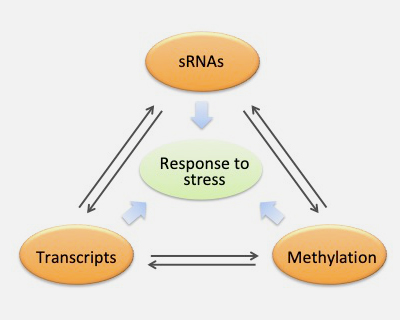Title: Environment-related Gene Regulatory Networks involved in multilevel modulation of the stress response in Melon
Research group: Non-coding RNA-mediated regulatory networks
Environmental stresses (largely facilitated by climate change) limit the productive potential of many agricultural species. Faced with adverse environmental situations, the plant sets in motion multiple processes of gene expression regulation with the aim of counteracting these effects. In our group we study how these complex regulatory networks influenced by the environment play a critical role in modulating plant-environment interactions. This project aims to understand how processes occurring simultaneously at 3 different regulatory levels (siRNAnoma, transcriptome and epigenome) modulate the melon plant response to stress. This knowledge will allow the development of global and innovative crop protection strategies.
Plants interact constantly with a wide array of adverse environmental cues that, in general, limit their normal development and productivity. These complex interactions result in several stress situations that disturb the plant-cell homeostasis affecting their growth negatively. Consequently, stress-induced damages in productivity are the primary cause of extensive agricultural losses worldwide. Several crop production models project a reduction in the crops yield in future, mostly due to climatic change. Consequently, a significant increase in crop production in order to meet the growing challenges stemming from rapid population growth and climatic change is needed. Plants respond to stress through a complex reprogramming of their transcriptional activities with the aim of reducing the impact of stress on their physiological and cell homeostasis. It is expected that such transcriptional alterations should be integrated into multi-layered regulatory networks able to modulate the interplay between the plant and the environmental stimuli. Diverse studies have uncovered complex regulatory processes that coordinate at transcriptional, post-transcriptional and epigenetic level- the plant adaptation to changing environmental conditions. However, most of our knowledge about the responses to stress comes from studies in model plants and a very few stress-related regulatory networks from crops have been studied in detail. Melon (Cucumis melo) is a crop of great economic importance that is extensively cultivated in semi-arid zones of diverse world regions. The main producers outside Asia are USA and Spain. The recent development of molecular tools such as EST collections, TILLING platforms, and genome sequencing, has favored the emergence of melon as a valuable experimental system to conduct agricultural related research focused on development or response to stress. Plant developmental plasticity in response to climate change will be critical in maintaining ecosystem function and agricultural productivity in the future. Currently, our ability to understand and predict plant developmental responses to climate change is limited by the number of experiments that are conducted in physiologically relevant stress conditions. A more holistic understanding of plant responses to environment requires integration of data from multiple levels of biological research. Improving our mechanistic understanding of plant developmental responses to multiple, interacting factors of climate change will be critical for anticipating impacts on agricultural systems. However, most of the previous and current experimental efforts are usually focused on analyzing the effects of stress at specific regulation levels and in general it is unclear how the response to stress is coordinated at multilevel scale. In this proposal we assume the conceptual frame that complexes Environment-related Gene Regulatory Networks (EGReNs) play a key role in the modulation of the plant-environment interactions. Therefore, this project aims to understand how the processes that simultaneously occurs in melon plants at 3different regulatory levels (siRNAnome, transcriptome and epigenome), modulate plant-response to environmental instability. This knowledge will allow inferring and validate "in vivo" multilevel EGReNs involved in the control of these phenomena and identify common effectors to different stress responses, allowing the development of global crop protection strategies.
Gustavo Gómez
- Maria Carmen Marquez
- Joan Marques-Molins
- Luis Cervera-Seco
Ministerio de Ciencia, Innovación y Universidades
















